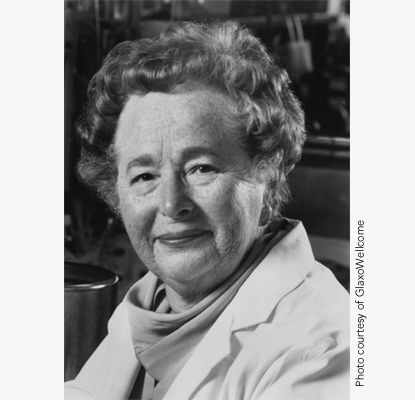Gertrude Elion
Powerless to help her grandfather fight cancer and her fiancé combat a life-threatening bacterial infection, Gertrude "Trudy" Elion wanted to give all she could to help save the lives of others. Despite her family's poor financial situation and the limited options for women in science at that time, Elion pursued a career in chemistry and research, developing cures for deadly diseases like cancer and leukemia. In 1997, Elion was honored with the Lemelson-MIT Lifetime Achievement Award.
During her groundbreaking career in medicine, Elion earned 45 patents. In the 1950s, she developed 6-mercaptopurine and Thioguanine—successful treatments for leukemia. She also developed Azathioprine, to suppress the immune system and enable organ transplants; Acyclovir, to treat the herpes virus; Allopurinal, for use in chemotherapy and to treat gout; Pyrimethamine, to treat malaria; and Trimethoprim (combined with sulfa), to work against bacterial infections.
Due to the Depression and forbiddance of women in research, Elion had a difficult time finding a job. In 1944, she was finally hired by Burroughs Wellcome (now Glaxo Wellcome) as a senior research chemist alongside Dr. George Hitchings, who specialized in nucleic acids.
Together, Elion and Hitchings' research methodology—studying cell reproduction among normal and abnormal cells—earned them the Nobel Prize in Medicine (1988) and paved the way for the development of AZT, the first effective drug for treating AIDS.
Elion encouraged and shared her knowledge with aspiring scientists throughout her career, from helping young women succeed in a male-dominated field to teaching future generations in her latter years as a Research Professor at Duke University.
Born in 1918 in New York City, Elion received a BS and MS in chemistry from Hunter College (1937) and New York University (1941), respectively. Though she was never able to finish her doctorate, she later received four honorary doctorate degrees. After her retirement, Elion served as Scientist Emeritus and Consultant for Burroughs Wellcome. She was the first woman inducted into the National Inventors Hall of Fame (1991) and was also awarded the National Medal of Science (1991). Elion continued to work in her lab and teach until she died, in February 1999.
Science to me is almost like a religion. To me, science is truth and truth is beautiful. Gertrude Elion, in "Me & Isaac Newton"—a 1999 feature-length documentary by Michael Apted that delves into the hearts and minds of seven scientists.


